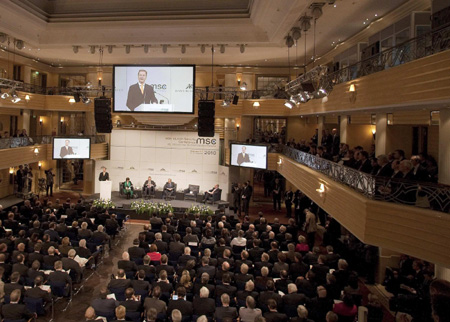Asia-Pacific
Western officials dismiss Iranian nuclear proposal
(Agencies)
Updated: 2010-02-06 19:37
 |
Large Medium Small |
|
 German Foreign Minister Guido Westerwelle delivers his speech during the 46th Conference on Security Policy in Munich February 6, 2010. [Agencies] |
MUNICH: Iran's claims to be close to an agreement on its nuclear program have yet to be backed up by any concrete actions, Western officials said Saturday at a gathering of the world's top defense officials.
| ||||
But German Foreign Minister Guido Westerwelle, whose country has joined the five permanent UN Security Council members in negotiations with Tehran, dismissed Mottaki's comments as nothing new. He said Iran has been offered a reasonable proposal to defuse the standoff.
"If it's not more than we heard yesterday, then have to say unfortunately this is not a new transparency," Westerwelle said. "It does not mean there is a change - that is the situation and we have to face it."
On the sidelines of the conference, Mottaki met with IAEA Director General Yukiya Amano behind closed doors, but it was unclear whether he brought anything new to the table on the tentative plan that would have Tehran ship out most of its enriched uranium and wait for it to be returned in the form of fuel for a research reactor.
The UN is considering a fourth round of sanctions against Iran for failing to rein in its nuclear ambitions.
US national security adviser Ret. Gen. James Jones, spoke of Iran's continued "puzzling defiance" to Western demands that it freeze its uranium enrichment program. He said that negotiators have been seeking to persuade Iran to take a new course.
"We have not seen indications that it is willing to do so at this time," he said.
Iran now possesses more than enough enriched uranium for at least one nuclear warhead and the UN Security Council has demanded the Islamic Republic freeze its enrichment program. The agreement worked out by the International Atomic Energy Agency would delay Tehran's ability to make such a weapon by requiring the country to export 70 percent of its uranium stock and then wait for up to a year for it to be processed and returned as fuel rods for the research reactor.
Iran has stopped short of accepting the agreement in its entirety, offering a shorter turnaround time for return of the fuel rods. On Friday, Mottaki indicated that Iran would insist on determining the amount of uranium that would be exchanged.
Jones emphasized that Iran is running out of time before the Security Council considers sanctions.
German Defense Minister Karl-Theodor zu Guttenberg dismissed Mottaki's comments as a "transparent play for time."










